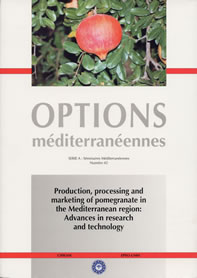| Article précédent | p. 163-167 | Article suivant |
Study of the rooting capacity of ten pomegranate clones (Punica granatum L.)
Hardwood cuttings are the most commonly used method of propagation of rootstocks and, in many cases, of varieties. The experiment was carried out in the open air at normal temperatures, taking hardwood cuttings from trees cultivated in homogeneous conditions. These were planted on 18/2/97, immediately after they had been taken and were evaluated on 14/7/97. Two factors which effect root formation were studied: (i) treatment with indole butyric acid (IBA) at four concentrations (2000, 4000, 8000 and 12,000 ppm); and (ii) wounding at the cuttings' base. The results clearly demonstrate that IBA generally increases the percentage of rooting (although not at all concentrations), with 12,000 ppm producing the best results in the clones studied. In addition, wounding carried out at the base of the cutting further increased the percentage of rooting in most of the clones studied.
- [ Afficher ]
- [ Télécharger ]
- [ Exporter la citation ]
Vous pouvez télécharger la citation au format :
- [ Imprimer ]
-
Mots-clés
ABATTAGE D'ARBRES, ACIDE BUTYRIQUE, BOIS DE FEUILLUS, ENRACINEMENT, GRENADE FRUITSCiter cet article
Melgarejo P., Martínez J., Amorós A., Martínez R. Study of the rooting capacity of ten pomegranate clones (Punica granatum L.). In : Melgarejo P. (ed.), Martínez-Nicolás J.J. (ed.), Martínez-Tomé J. (ed.). Production, processing and marketing of pomegranate in the Mediterranean region: Advances in research and technology. Zaragoza : CIHEAM, 2000. p. 163-167. (Options Méditerranéennes : Série A. Séminaires Méditerranéens; n. 42). Symposium on 'Production, processing and marketing of pomegranate in the Mediterranean region: Advances in research and technology', 1998/10/15-17, Orihuela (Spain). http://om.ciheam.org/om/pdf/a42/00600267.pdf



